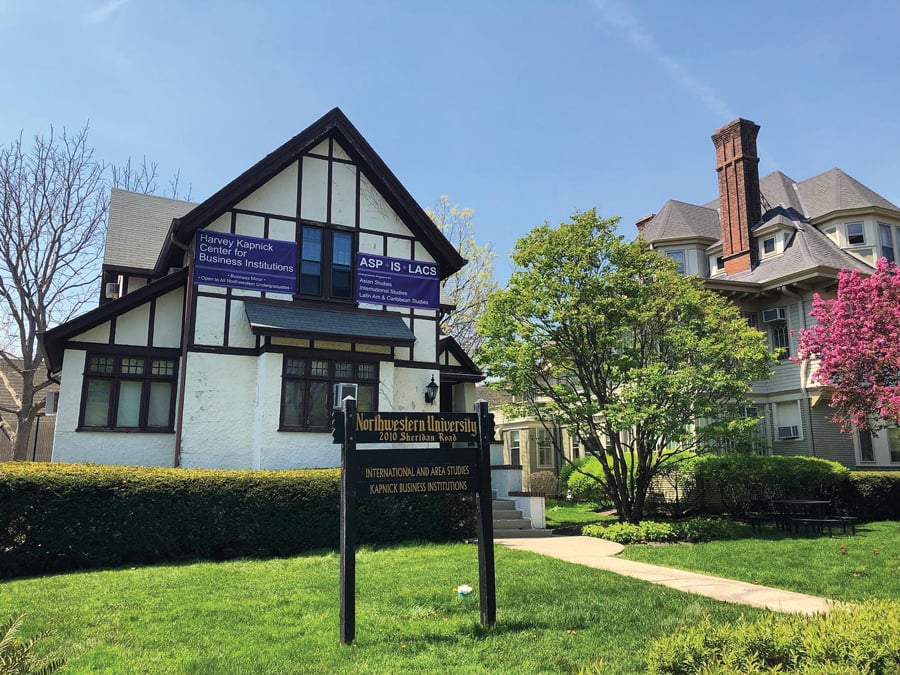Professor talks art and politics in the Middle East at Global Café
Courtesy of Harvey Kapnick Center for Business Institutions
The Center for International and Area Studies, 2010 Sheridan Road. The Global Café invited Prof. Silverstein to talk on Middle Eastern culture and politics at a Wednesday night talk.
February 5, 2020
The Global Café hosted a discussion on “War and Music in Syria” with Communication prof. Shayna Silverstein Wednesday at the Center for International and Area Studies.
The event consisted of a roundtable dinner discussion where Silverstein discussed her research on the politics and aesthetics of music in Syria and the Middle East. Silverstein showed various art pieces including performance art, dance and music rooted in Middle Eastern culture and politics.
A piece by Mithkal Alzghair, a Syrian dancer, showed performers dancing Dabke, a Levantine folk dance traditionally associated with weddings and community gatherings. The piece featured little music, instead focusing on a repetitive footwork routine.
Silverstein said this performance was a way to express the choreographer’s frustrations with media representations of Syrian refugees.
“He created this work in order to say, ‘Here I am as a Syrian, and I am performing in front of you, and I want you to engage with me and with my corporeal form, my body,’” Silverstein said. “‘So that means listening to my feet stomp on the floor, that means hearing me breathe while I go through the labor of performing for you.’”
After Silverstein’s presentation, students asked about European influences in the politicization of art and Silverstein’s interest in Syria. Silverstein said her interest in the Middle East came from the post-9/11 political atmosphere in which she began graduate school.
Silverstein started studying Arabic. She later traveled to Syria and became interested in classical Arab art music known as Tarab.
“I wanted to know more about who is the perceived enemy of the forever war,” Silverstein said.
Lekisha Gunn, a graduate student and Global Café mentor, said “War and Music in Syria” had the biggest turnout of the winter quarter event series.
Communication sophomore Karina Patel was among the attendees and said she had previously attended a talk given by Tania El Khoury, a performance artist whose work was mentioned during the event. El Khoury, who focuses on interactivity and the political potential of art, came to Northwestern in April 2019 to give an artist talk.
“The best part was watching all the different examples of different forms of art that I would have never come across,” Patel said.
Communication sophomore Claire Kwon said she was interested in the event because she came from a dance background.
“I love learning about new dance styles,” Kwon said. “Especially how traditional dance styles can be taken and modernized, and seeing how different influences can add to those styles.”
The Global Café event series, which occurs every Wednesday night, features professors from different departments. On Feb. 16 the series will feature Weingberg prof. Ji-Yeon Yuh, who will discuss the global consequences of the Korean War.
Gunn said Global Café’s talks invite students and professors to build relationships with each other by talking about their projects and research.
Maria De Simone, another mentor at Global Café, said working as a mentor gave her more opportunities to build relationships with undergraduates. As mentors, De Simone and Gunn hold office hours and talk to students about fellowship and research opportunities as well as career trajectories.
“For us,” De Simone said, “it’s an experience that hopefully one day will be our job.”
Email: anushuya@u.northwestern.edu
Twitter: @anushuyathapa



